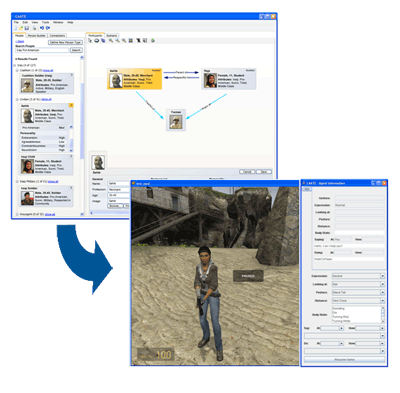Charles River Analytics, a developer of cutting-edge technologies for intelligent systems, announced new initiatives to improve virtual training for the US military. Key to their efforts is their work on three ongoing contracts: MIST, Crowd.Builder, and CAATE, along with Dr. Peter Weyhrauch joining the company as a Senior Scientist.
MIST is focused on developing multimodal interaction capabilities that allow Soldiers to naturally interact with semi-autonomous forces within virtual training environments. Dr. Ryan Kilgore, Senior Scientist at Charles River, explained: “Typically, interactions within such training environments are limited to conventional human-computer interfaces (e.g., mouse, keyboard, joystick), which map poorly to the actual communication methods used by Soldiers in small-unit operations. Under this Army/RDECOM sponsored effort, we designed and prototyped a reconfigurable, Soldier-worn hardware system capable of detecting and identifying the Soldier’s natural physical gestures and verbal command, and then communicating these commands to other entities within a virtual training environment. This system includes a suite of light-weight motion and proximity sensor modules worn by the Soldier in a wireless, reconfigurable personal area network (PAN). Working with Forterra Systems, we are demonstrating the use of this sensor suite in capturing the trainee’s natural physical gestures, and using these gestures to drive the behaviors of virtual teammates within Forterra’s On-Line Interactive Virtual Environment (OLIVE™).”
With Crowd.Builder, Charles River is designing and developing a socio-cultural crowd artificial intelligence (AI) model to support training Soldiers in culturally realistic crowd interactions. “To support this Army/RDECOM effort with Forterra Systems Inc.,” explained Sean Guarino, Senior Software Engineer at Charles River, “we have identified the key cognitive and behavioral features of crowds that must be captured to produce culturally and socially realistic behaviors, and are designing and developing a socio-cultural behavior model to satisfy these requirements, leveraging our existing social network modeling and analysis tool (CONNECT™) and our agent-based behavior modeling tool (AgentWorks™). We are also assisting Forterra Systems in designing their AI API for integrating Crowd.Builder within Forterra’s OLIVE virtual world platform.”
The CAATE project is focused on developing tools that make it possible to rapidly and cost-effectively develop training applications for soldiers that teach them key social and cultural skills. “Today’s warfighters are increasingly engaging in peacekeeping missions, humanitarian missions, and stability and support operations,” explained Dr. Scott Neal Reilly, Vice President of Decision Management Systems at Charles River. “These missions require a variety of new skills that the U.S. Army has not traditionally focused on, especially in the training arena. By using computer game technology and cutting-edge artificial intelligence (AI), we can create realistic, immersive virtual training environments that every soldier can have on his or her laptop, to teach critical social and cultural skills. For instance, soldiers using CAATE will learn how to successfully interact with realistic, but virtual, Afghans in a completely safe, virtual environment.”

The CAATE development tool
CAATE, which is sponsored by Office of the Secretary of Defense (OSD) and managed by the Army Research Institute (ARI), is another collaboration with Forterra Systems where Charles River is leveraging the OLIVE virtual world platform to rapidly develop effective training applications. CAATE is also a collaboration with Aptima, Inc. of Woburn, MA. Dr. Mike Keeney of Aptima is developing the training curricula for socio-cultural lessons and is also developing methods for validating the effectiveness of these new training systems. Dr. Neal Reilly spoke about the collaboration between the two companies, “We are very excited to be working with Aptima on this project. They bring a great deal of experience in military training and socio-cultural knowledge that provides a key component to the success of the project.”
Dr. Peter Weyhrauch
Charles River is also pleased to announce that Dr. Peter Weyhrauch has joined the company as a Senior Scientist to support new military training initiatives. Dr. Weyhrauch’s research interests include game-based simulation and training and interactive narrative technology. Dr. Neal Reilly said, “Dr. Weyhrauch has been developing advanced AI agents and interactive narrative systems for 20 years. His most recent experience has been in the game industry, and so he brings tremendously useful experience with relevant technologies that we can leverage to create immersive environments and realistic software agents. Dr. Weyhrauch is helping us design and implement the CAATE system and will play a critical role as we move out in this business area.”
The views, opinions, and/or findings contained in this announcement are those of the author(s) and should not be construed as an official Department of the Army position, policy, or decision.
